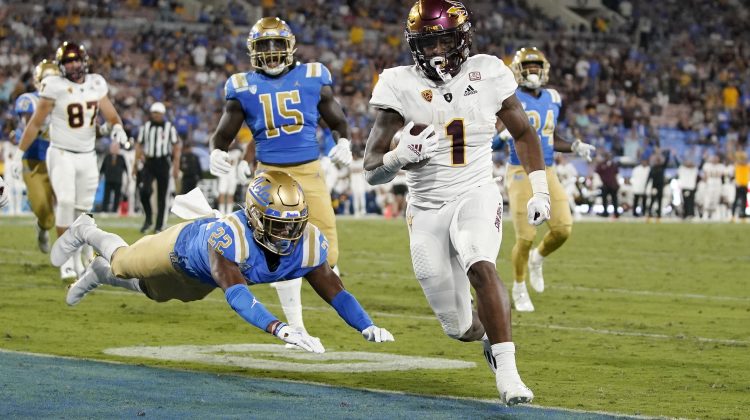Story by Jon Wilner
It feels early for a make-or-break game, but that’s exactly the situation unfolding in the Pac-12’s South division this week as Arizona State visits Utah.
If ASU wins, the race is all but over. The Sun Devils would have a significant lead with a manageable schedule and tiebreaker advantages on their closest pursuers, whose schedules aren’t nearly so manageable.
Here’s the situation:
— ASU (5-1/3-0) and Utah (3-2/2-0) are the only teams without a loss in conference play.
— With a victory Saturday, the Sun Devils would hold a one-game lead in the loss column and the head-to-head tiebreaker advantage over the only teams with one loss.
— Effectively, the Sun Devils would be two games up on both Utah and UCLA (4-2/2-1).
And that two-game lead would work hand-in-hand with a stretch-run schedule that provides ASU with plenty of chances to tighten its grip on the division.
How many chances?
For insight, the Hotline turned to an expert: Kenny White, an analyst for SportsLine and legend in the sports gambling industry.
White is the former head of the Las Vegas Sports Consultants, the highly influential group that sets the opening lines used by the casinos. He also publishes power ratings and a data-packed college football magazine.
We asked White to set the odds for each of ASU’s remaining games.
In return, he provided not only odds but also win probabilities and projected final scores, all based on his analytics:
Opponent: at Utah
ASU point spread: +2.5
ASU win probability: 42.9
Final score: Utah 27, ASU 24
Opponent: vs. Washington State
ASU point spread: -19.5
ASU win probability: 91.5
Final score: ASU 37, Washington State 17
Opponent: vs. USC
ASU point spread: -11
ASU win probability: 78.1
Final score: ASU 35, USC 24
Opponent: at Washington
ASU point spread: +2
ASU win probability: 44.3
Final score: Washington 23, ASU 21
Opponent: at Oregon State
ASU point spread: -3.5
ASU win probability: 59.7
Final score: ASU 31, Oregon State 28
Opponent: vs. Arizona
ASU point spread: -28.5
ASU win probability: 97.7
Final score: ASU 35, Arizona 9
Granted, the three road games are fairly daunting.
Utah found a quarterback and discovered its identity last weekend in a blowout victory at USC. Washington’s defense is among the best in the conference. So is Oregon State’s running game.
And the trips to the Pacific Northwest come on back-to-back Saturdays in November, when the weather could be inhospitable to desert dwellers.
But notice the point spreads: The Sun Devils are slight favorites in Corvallis and narrow underdogs in Salt Lake City and Seattle.
All three are basically toss-ups.
Also, ASU doesn’t need to run the table, as long as it beats Utah this week.
Win Saturday, and the Sun Devils would need victories in four of their last five games. They would be heavy favorites in three, a narrow favorite in one and a slight underdog in on
Let’s say they lose at Washington. Then it’s a matter of winning four games in which they’re favored.
And don’t forget: Our little exercise presumes either Utah or UCLA wins out.
The Bruins must play Washington, Utah and USC on the road and Oregon at home.
The Utes must play Oregon and UCLA at home and Stanford and Oregon State on the road.
The likelihood of either UCLA or Utah finishing with a single conference loss — the loss to ASU — is fairly remote.
Which means the Sun Devils could lose twice and still be in solid shape if they beat Utah, because they would own the tiebreaker over the Utes or Bruins in a two-loss scenario.
Two things, equally true: It’s early, and this is a make-or-break game. If the Sun Devils win Saturday night, the South race is just about over.
Support the Hotline: Receive three months of unlimited access for just 99 cents. Yep, that’s 99 cents for 90 days, with the option to cancel anytime. Details are here, and thanks for your support.
*** Send suggestions, comments and tips (confidentiality guaranteed) to pac12hotline@bayareanewsgroup.com or call 408-920-5716
*** Follow me on Twitter: @WilnerHotline
*** Pac-12 Hotline is not endorsed or sponsored by the Pac-12 Conference, and the views expressed herein do not necessarily reflect the views of the Conference.
Related posts:
 Wilner Hotline – Wildfire Smoke Could Cause Havoc in Pac-12 Football Season
Wilner Hotline – Wildfire Smoke Could Cause Havoc in Pac-12 Football Season

(AP Photo/Ralph Freso, File)
Pac-12 recruiting update: Oregon lands four-star WR, Washington hopes to keep Tacoma QB at home and UCLA changes its strategy
(AP Photo/Ralph Freso, File)
Hotline mailbag: Kliavkoff’s culpability, Pac-12 expansion options, the future for Cal and Stanford, valuing the Arizona schools and loads more
(AP Photo/Ralph Freso, File)
Pac-12 football preview: The top 10 trap games for 2022
